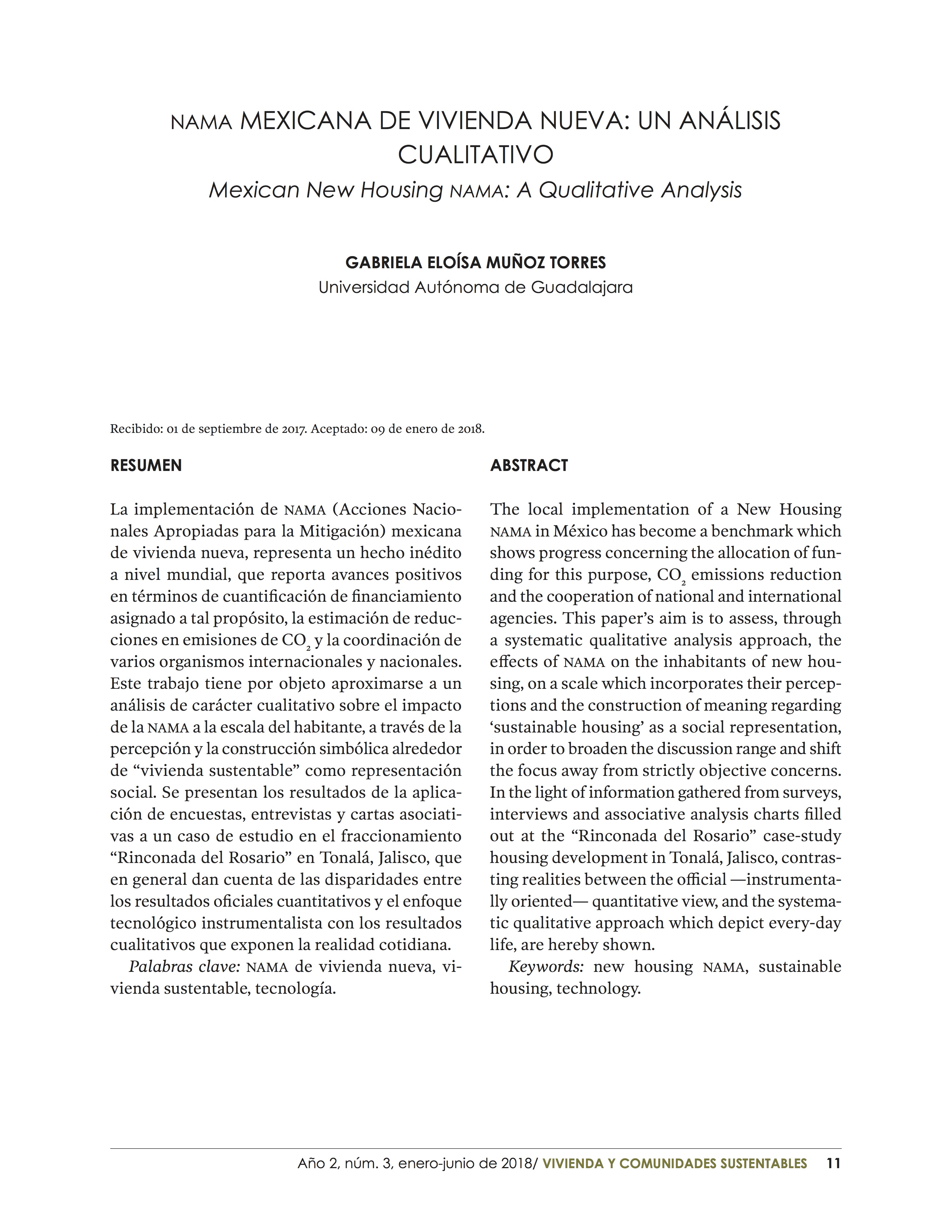Mexican NAMA for new housing: a qualitative analysis
DOI:
https://doi.org/10.32870/rvcs.v0i3.29Keywords:
New housing NAMA, sustainable housing, technologyAbstract
The local implementation of a New Housingnama in Mexico has become a benchmark which shows progress concerning the allocation of funding for this purpose, CO2 emissions reduction and the cooperation of national and international agencies. This paper’s aim is to assess, through a systematic qualitative analysis approach, the effects of NAMA on the inhabitants of new housing, on a scale which incorporates their perceptions and the construction of meaning regarding ‘sustainable housing’ as a social representation, in order to broaden the discussion range and shift the focus away from strictly objective concerns. In the light of information gathered from surveys, interviews and associative analysis charts filled out at the “Rinconada del Rosario” case-study housing development in Tonala?, Jalisco, contrasting realities between the official —instrumentally oriented— quantitative view, and the systematic qualitative approach which depict every-day life, are hereby shown.References
Abric, J. (2001). Prácticas sociales y representaciones. México: Ediciones Coyoacán.
Auditoría Superior de la Federación. (2012). Política pública de vivienda. Evaluación núm. 1164. México.
Carbon Market Watch. (2015). Guía de iniciación a las NAMA. Bruselas.
Conavi. (2008). Programa específico: Desarrollo Habitacional Sustentable ante el Cambio Climático. México. Recuperado de: http://www.conavi. gob.mx/documentos/normateca/Programa Especifico de Desarrollo Habitacional Sustentable ante el Cambio Climatico.pdf
——. (2012). Supported nama for Sustainable Hou- sing in Mexico —Mitigation Actions and Financing Packages—. México.
Hernández, R., Collado, C., y Baptista, M. del P. (2010). Metodología de la investigación, 5a edición, vol. 9. México: McGraw-Hill.
INECC. (2016). Acciones Nacionalmente Apropiadas de Mitigación (NAMA). Recuperado de: https:// www.gob.mx/inecc/acciones-y-programas/ acciones-nacionalmente-apropiadas-de-mitigacion-namas
Infonavit. (1987). XV años de servir a los trabajadores. México.
——. (2013). Sistema de Evaluación de la Vivienda Verde. México.
——. (2017). ¿Qué son las ecotecnologías? Recuperado de: http://portal.infonavit.org.mx/wps/wcm/ connect/Infonavit/Contactanos/Aclara+tus+du- das/Trabajadores/Ahorro_cuido_medio_am- biente/01_Que_son_las_ecotecnologias
IRENA. (2014). Manual de irena sobre Acciones de Mitigación Nacionalmente Apropiadas (NAMA) en el sector de las energías renovables. Abu Dhabi.
Quintanilla, M. (2005). Tecnología: Un enfoque lo- só co. México: Fondo de Cultura Económica.
Latour, B. (2001). La esperanza de Pandora. Ensayos sobre la realidad de los estudios de la ciencia. Barcelona: Gedisa.
Marcuse, H. (1993). El hombre unidimensional. México: Planeta Mexicana.
Mitcham, C. (1989). ¿Qué es la filosofía de la tecnología? Barcelona: Anthropos Editorial.
Mumford, L. (1971). Técnica y civilización. Madrid: Alianza Universitaria.
Nama Facility. (2017). Implementation of the New Housing nama Mexico (nama Facility). Recuperado de: http://www.nama-facility.org/pro- jects/implementation-of-the-new-housing-na- ma-mexico/
ONU. (2014). Más de la mitad de la población vive en áreas urbanas y seguirá creciendo. Naciones Unidas-Departamento de Asuntos Económicos y Sociales (ONU DAES). Recuperado de: http:// www.un.org/es/development/desa/news/popu- lation/world-urbanization-prospects-2014.html
Sedue. (1985). Ecotecnología: Un marco conceptual. México.
SHF. (2017). Nama Facilty. Recuperado de: http:// www.ecocasa.gob.mx/Paginas/programas de vivienda sustentable shf/nama facilty.aspx
United Nations Framework Convention on Climate Change. (2014). Appendix II: Nationally Appropriate Mitigation Actions of Developing Country Parties. Recuperado de: http://unfccc.int/mee- tings/cop_15/copenhagen_accord/items/5265. php

Downloads
Published
How to Cite
Issue
Section
License
Copyright (c) 2018 Vivienda y Comunidades Sustentables

This work is licensed under a Creative Commons Attribution-NonCommercial-NoDerivatives 4.0 International License.
The authors who publish in this journal accept the following conditions:
In accordance with the copyright legislation, Sustainable Housing and Communities recognizes and respects the moral right of the authors, as well as the ownership of the patrimonial right, which will be transferred to the University of Guadalajara for its dissemination in open access. Sustainable Housing and Communities does not charge authors for submitting and processing articles for publication. Authors may make other independent and additional contractual agreements for the non-exclusive distribution of the version of the article published in Sustainable Housing and Communities (for example, include it in an institutional repository or publish it in a book) as long as they clearly indicate that the work is published for the first time in Sustainable Housing and Communities.





